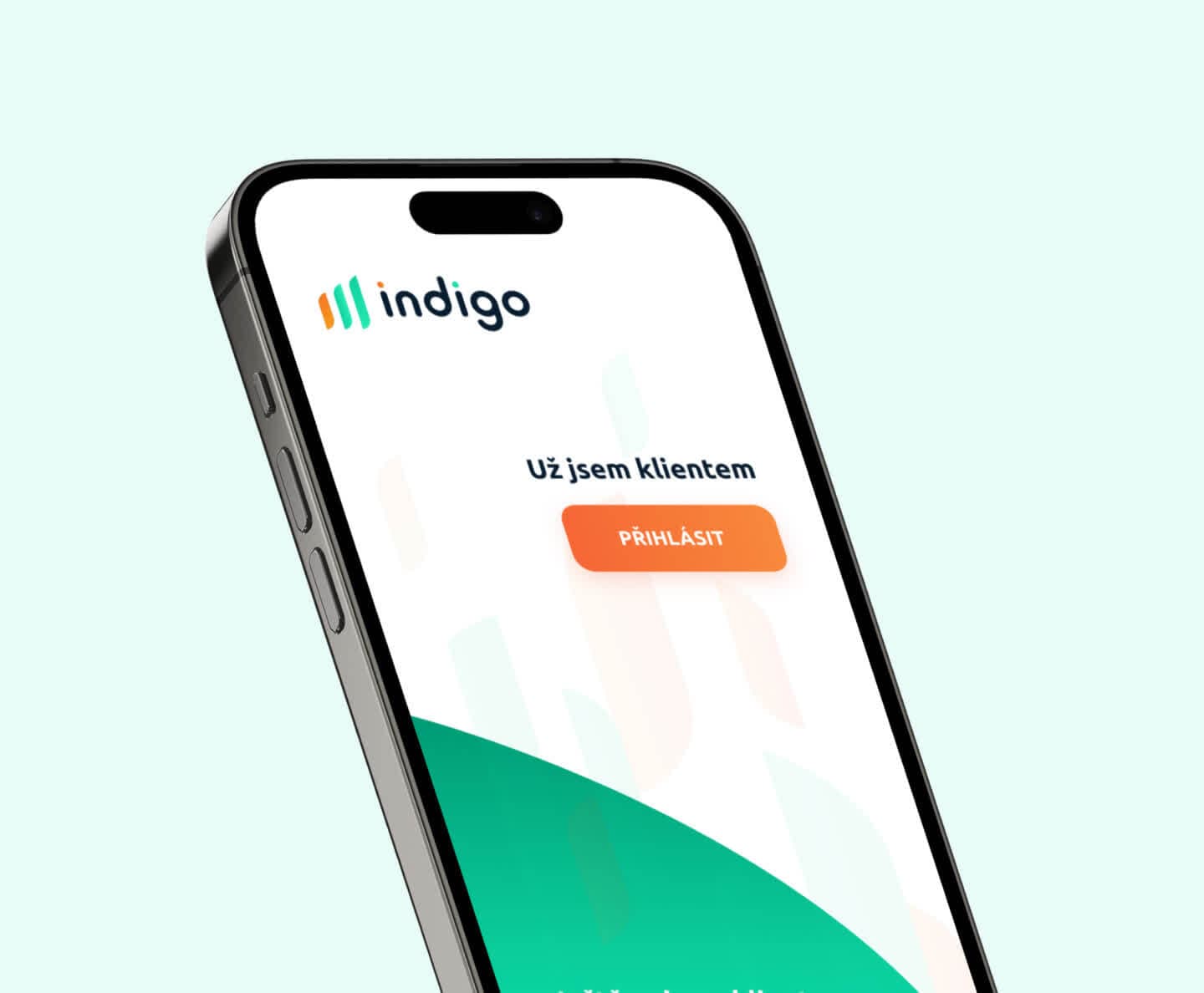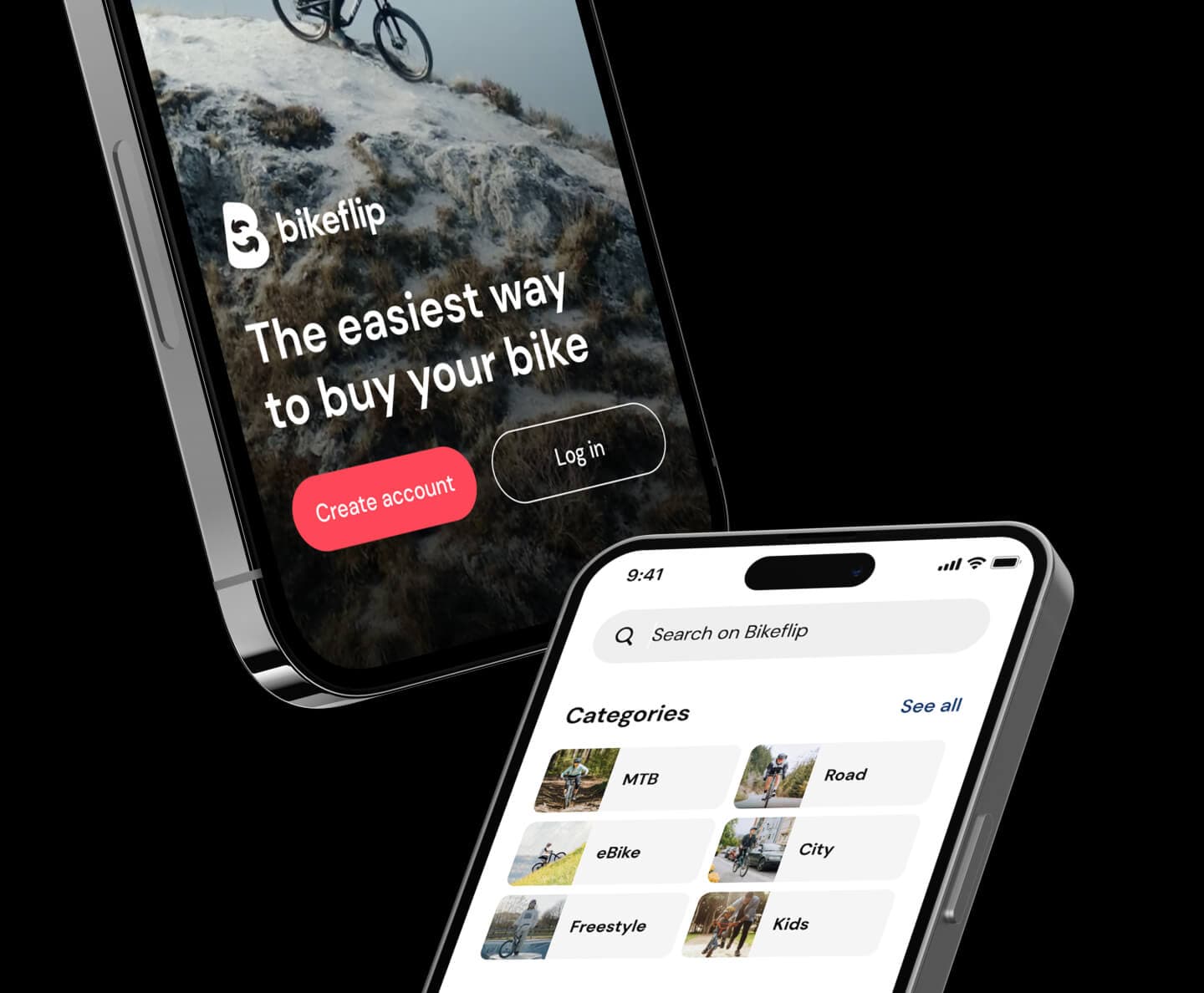Mobile application development
We build profitable mobile apps for iOS and Android.
2014
Year founded
30+
People in the team
300+
Mobile and web applications
25+
Successful startup exits
approx. 1.5 million
Active users monthly
80 %
Applications for startups
Successful applications from us

Application Indigo for Patria Finance
- Digitalisation
- Fintech
- Design
- Mobile app
- Web app
- 2017-present

Cybex - Smart Stroller App
- Design
- Mobile App
- IoT
- 2019-present
Bikeflip
An international marketplace with 80,000+ active users. Thanks to Flutter technology, we reduced development costs by 40% and accelerated time to market by 2 months.
We hired Pixelmate to create the Bikeflip Web App from the grounds up. They delivered a stable app that performed well from the moment we launched it.

What's behind the success of our apps?
We are not "just" developers
When we develop a project, we think about its real use on the market, we design our own solutions, we put ourselves in the role of the project owner. We are not blind technology geeks.
Love for startups
We consider ourselves a startup. Yet we have had dozens of startups pass through our hands. We have learned from them the principles that lead to success, we have learned from many mistakes.
No halfway solutions
Whether we're developing a mobile or web app, we do it right. We're not a company that hires programmers from the other side of the planet and we never use outdated technology.

Step-by-step mobile app development
Every successful application must stand on a solid foundation
At this stage, we help design the application to maximize its success.
Every successful application must stand on a solid foundation
At this stage, we help design the application to maximize its success.
Every successful application must stand on a solid foundation
At this stage, we help design the application to maximize its success.
Every successful application must stand on a solid foundation
At this stage, we help design the application to maximize its success.

I want a no-obligation project consultation
Contact usTech stack
Swift - Programming language for custom mobile app development
React - Programming language for custom hybrid mobile app development
Flutter - Programming language for custom mobile app development
Kotlin - Programming language for custom Android app development
Laravel - Framework for custom backend development and administration
PHP - Programming language for custom application development
Java
VueJS
Node - Programming language for custom application development
Python - Programming language for custom application development
Amazon - Provider of server solutions
Firebase
Docker
Bitrise
Jenkins
Technologies for mobile app development
It used to be true that top quality required native development. Today (in 2026), cross-platform development such as Flutter is changing the rules of the game.
Cross-platform vs. native app development
Most common topics when choosing technologies in the mobile app world
Does a mobile app need a backend and cloud infrastructure?
In the vast majority of cases, yes. Modern mobile apps today:
- run on a cloud-based backend
- have databases, users, logic, and data management outside the app itself
- communicate via API
The backend is the “brain” of the entire app — it controls behavior, stores data, enables scaling, and supports further development. Without it, only very limited types of apps make sense.
How to choose the right technology for a mobile app?
There is no single best technology for all projects. The right choice depends on:
- the type of application
- whether it is a new app
- the budget
A common issue is that developers recommend technologies they know how to use. We approach it the opposite way — we focus on the product and business first, and only then on technology. Ideally, technology choices should not be driven by developer availability but by the best options available on the market.
Which technologies do we use for mobile app development today?
We’ve been developing mobile apps since the very beginning of the industry and were among the first companies in the Czech Republic to offer mobile app development. Thanks to this, we have experience across technologies and can choose the right one for each specific project.
Native development
- Swift / SwiftUI (iOS)
- Kotlin (Android)
Cross-platform development
- Flutter – our preferred solution for most new projects
Maintenance of legacy apps
- React Native – mainly due to long-term support of existing projects
Which technologies are unsuitable for mobile app development today?
Some technologies are now considered clearly unsuitable or risky for new projects:
Discontinued or gradually abandoned technologies
- Xamarin
- Ionic
- and other technologies without active development and support
These solutions carry risks such as:
- maintenance issues
- lack of developers
- the need to rewrite the app in the future
- potential exclusion from the App Store and Google Play
Are PWAs suitable as a replacement for mobile apps?
In most cases, no.
PWAs (Progressive Web Apps) may work for very simple, internal projects, but are unsuitable for most startups due to:
- complicated or nearly impossible installation for non-technical users
- problematic availability in the App Store and Google Play
- limited access to phone hardware features
- poor performance and very limited design capabilities
Despite this, PWAs are often offered as a “cheap app alternative,” which in practice frequently fails. Unfortunately, app owners often realize this only after seeing uninstall statistics from their users.
How do we ensure the technology will still be usable in several years?
When choosing technologies, we monitor:
We don’t want to build on technologies that are already losing popularity at the start of a project and will be hard to maintain or develop in the future.
A technical insight from our Head of App Development
Mobile apps are now a very powerful marketing tool for companies — they are literally at the customer’s fingertips and enable long-term engagement. At the same time, it’s still a relatively young industry offering huge opportunities for new ideas and products. That’s precisely why it’s important to avoid basic beginner mistakes. Development should be based on technologies that are current and sustainable even ten years from now, while respecting the high demands for design, speed, and quality set by today’s most widely used apps. When these principles are combined with a good idea and proper execution, a mobile app can become a highly functional and fast-growing business.
Matyáš has over 14 years of experience in mobile app development (Flutter, native development) and startups. His first experience came from his own startup — an event-management mobile app. At Pixelmate, he was involved in the early stages of successful startups like Bikeflip and also leads development of large platforms for companies such as ČSOB, Zonky, and Yves Rocher.
How much does mobile app development cost? (Updated: 2026)
Mobile app development pricing is always individual. Below you’ll find indicative ranges for reference.
Ideal Start for an MVP Mobile App
This budget level is suitable for MVP mobile applications – both for startups starting from scratch and for smaller companies that need to start quickly and then develop the project further. "The goal at this stage is not to build a complete solution, but a functional, meaningful foundation that focuses on the main functionality and – most importantly – is robust and high-quality enough to be further expanded and enhanced after launch." Suitable for:
Ideal Start for an MVP Mobile App
This budget level is suitable for MVP mobile applications – both for startups starting from scratch and for smaller companies that need to start quickly and then develop the project further. "The goal at this stage is not to build a complete solution, but a functional, meaningful foundation that focuses on the main functionality and – most importantly – is robust and high-quality enough to be further expanded and enhanced after launch." Suitable for:
Ideal Start for an MVP Mobile App
This budget level is suitable for MVP mobile applications – both for startups starting from scratch and for smaller companies that need to start quickly and then develop the project further. "The goal at this stage is not to build a complete solution, but a functional, meaningful foundation that focuses on the main functionality and – most importantly – is robust and high-quality enough to be further expanded and enhanced after launch." Suitable for:
What’s next?
Mobile app pricing is a fairly complex topic. That’s why we cover it in detail on a dedicated page here.
What not to underestimate in app development
App developer or partner in online business?
We often encounter people who have an idea for a mobile application and find a developer who programs perfectly but doesn't want or have insight into the business side of the application. Before developing a mobile application, it's necessary to set a business model, consider marketing, and devise the functioning of the application so that it works not only technically but primarily commercially.
Choosing platforms and technologies
Before developing a mobile application, it's necessary to clarify in which technologies the project will be developed and how developers will ensure that anyone can take over their programming at any time. A good development studio should offer representability and programming languages that will have support in the future.
Choosing the approach to mobile app development
We adhere to the opinion that every line of written code should have its purpose. It seems logical, but unfortunately, it's not at all obvious. If you're getting into mobile app development, you should consider what the goal should be. Whether it's commercial success, long-term business, presenting to investors, or perhaps future sale.
What do I need besides mobile app development?
The field of mobile app development is very specific. There's a whole set of rules and processes associated with development that need to be traversed and understood for the resulting mobile app to have the maximum chance of success. Besides actual mobile app development, you'll likely need to publish the finished project on the App Store and Google Play, you'll need a server, backend, and knowledge in mobile marketing. A good development studio should be able to share its know-how.
Reliable partner
Developing a mobile application requires the approach of professionals who have years of experience in application development. Seek a partner who isn't learning to develop their first or second mobile application on your project. Experience and assistance in avoiding fatal mistakes can be invaluable in the future.
How will your app make money?
An app without a business model is like a plant without water. A well-designed app should be able to generate sufficient revenue for its operation and growth — sensitively, but sustainably.
The most common startup business model topics we work on:
Struggling to choose the right business model for your mobile app?
Let’s discuss it with no obligation.
A marketing insight from the Pixelmate team
A mobile app without a proper business model is like a plant without water. I often see app development treated separately from marketing, sales processes, and monetization strategy. Yet these areas must go hand in hand. From the very first feature and design proposals, it’s crucial to consider where users will come from, how they’ll move through the app, what experience they’ll have, and when — and for what — they’ll be willing to pay. For startups, building an app is therefore not just about development itself, but primarily about connecting strategy, marketing, and future product growth.
Míša has over 10 years of experience in online marketing. Throughout her career, she has worked in various marketing roles, from smaller digital agencies to specialist marketing positions at O2 Czech Republic. At Pixelmate, she has been focusing on strategic marketing since 2021.
We are a startup partner
80 % of the projects we deliver are for startups. They are built from scratch. We know that launching an online project is complex and challenging. We act as a startup partner from the initial idea all the way to managing project expansion.

